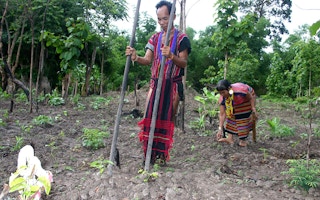Efforts to protect carbon-absorbing forests, which could have a massive impact on reducing global warming, only attract a tiny fraction of the billions of dollars spent on cutting emissions, experts said on Tuesday as they called for greater investment.
Almost 40 times more money has been spent on promoting agriculture and land development - which have led to large-scale deforestation - than on forest protection, they said in a study.
“Forests hold so much potential in the effort to limit climate change, and yet there’s a seemingly endless supply of money to help tear them down,” said Charlotte Streck, director of environmental group Climate Focus.
The study’s publication comes a fortnight before governments meet in Bonn to discuss implementation of the Paris climate accord after U.S. President Donald Trump announced earlier this year that the United States would withdraw.
“
Forests hold so much potential in the effort to limit climate change, and yet there’s a seemingly endless supply of money to help tear them down.
Charlotte Streck, director, Climate Focus
Under the Paris deal, countries pledged to keep the rise in average global temperatures below 2 degrees Celsius above pre-industrial levels and to strive for a lower 1.5 degree limit, to stave off the worst effects of climate change.
Experts say forests could absorb enough carbon to meet about a third of the efforts needed to stick to those goals.
But just 2 per cent of the $167 billion spent on reducing planet-warming carbon emissions since 2010 was invested in forests, according to the study by Climate Focus and other environmental groups.
Research has shown at least a quarter of the world’s carbon stored above the ground in tropical forests is found in territories managed by indigenous people and local communities.
But even though deforestation rates are lower in areas where indigenous people manage forests, much of their knowledge is not taken into account when international decisions about climate change are made, experts say.
“Us indigenous peoples are sad and worried that billions of dollars are being invested in corporations that drive agro-business and cause deforestation,” Candido Mezua, an indigenous leader from Panama, told an event on forests at the Royal Society in London.
“But very little is invested in what works: indigenous peoples and our forests, which are the best guarantee for a stable climate.”
At least 200 people were killed in 2016 while defending their homes, lands and forests from mining, dams and agricultural projects, according to advocacy group Global Witness.
Indigenous leaders speaking at the London event said they needed respect for their rights more than money to help them protect forests.
Research by Global Forest Watch shows more than a quarter of global tree cover loss last year happened in Brazil and Indonesia.
This story was published with permission from Thomson Reuters Foundation, the charitable arm of Thomson Reuters, that covers humanitarian news, women’s rights, trafficking, property rights, climate change and resilience. Visit http://news.trust.org)










